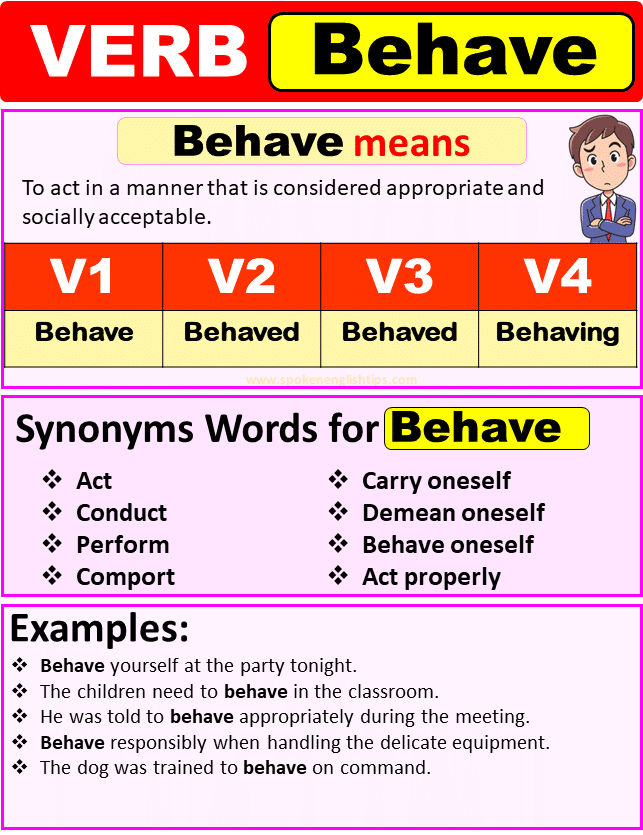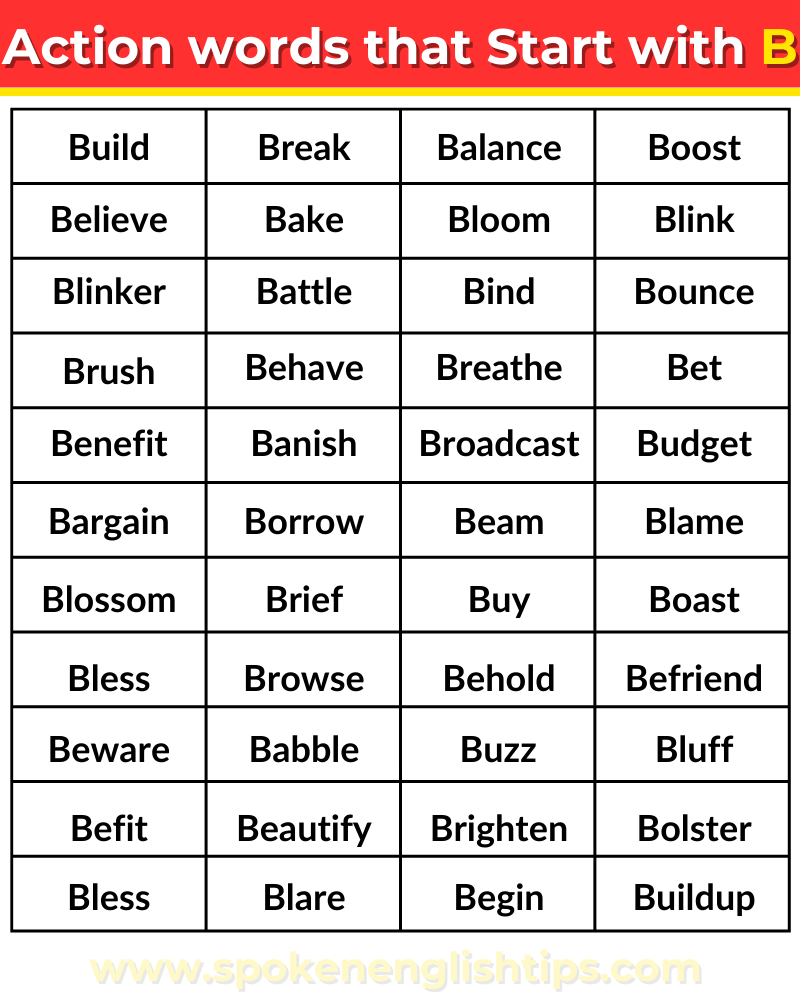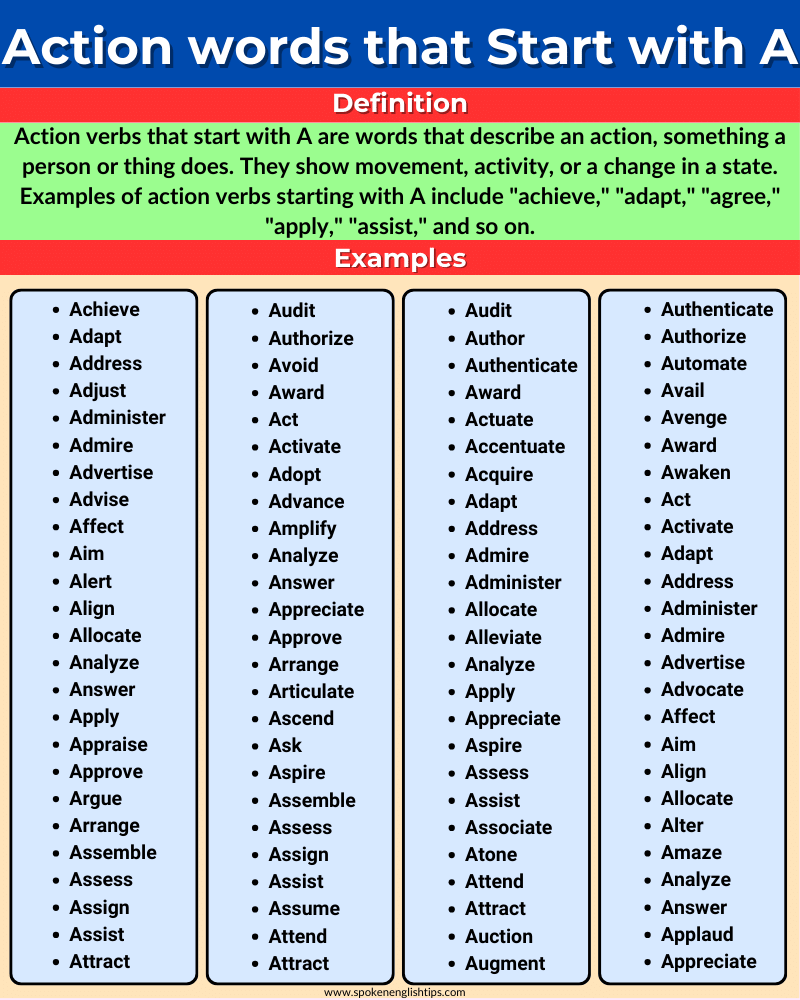Behave Verb Forms, Base Form, Past Tense, Past Participle & V1 V2 V3
| 1. | Base Form (Infinitive) (V1): | Behave |
| 2. | Simple Past (V2): | Behaved |
| 3. | Past Participle (V3): | Behaved |
| 4. | Present Participle (-ing): | Behaving |

See Also | List of Verbs V1 V2 V3 V4 Pdf Download
Behave Past Tense
| Behaved |
| Behaved is the past tense of the Behave word. |
Behave Past Participle
| Behaved |
| Behaved is the past participle of the Behave word. |
Behaved Verb forms V1 V2 V3 V4
| Infinitive | Past Simple | Past Participle | Present Participle |
| Behave | Behaved | Behaved | Behaving |
Conjugation of Behave
| Tense | Conjugation | Example Sentence |
|---|---|---|
| Simple Present | behave | I behave well in class. |
| Simple Past | behaved | She behaved rudely yesterday. |
| Simple Future | will behave | They will behave at the party. |
| Present Continuous | am/is/are behaving | He is behaving strangely today. |
| Past Continuous | was/were behaving | We were behaving like children yesterday. |
| Future Continuous | will be behaving | They will be behaving at the ceremony. |
| Present Perfect | have/has behaved | She has behaved perfectly so far. |
| Past Perfect | had behaved | By the time we arrived, they had behaved. |
| Future Perfect | will have behaved | By tomorrow, they will have behaved well. |
| Present Perfect Continuous | have/has been behaving | He has been behaving oddly lately. |
| Past Perfect Continuous | had been behaving | They had been behaving oddly all day. |
| Future Perfect Continuous | will have been behaving | By next month, he will have been behaving properly. |
Synonyms of Behave
- Act
- Conduct
- Perform
- Comport
- Carry oneself
- Demean oneself
- Behave oneself
- Act properly
- Act appropriately
- Act decently
- Act correctly
- Act well
- Act responsibly
- Act suitably
- Act politely
Behave Verb Examples
- Behave yourself at the party tonight.
- The children need to behave in the classroom.
- He was told to behave appropriately during the meeting.
- Behave responsibly when handling the delicate equipment.
- The dog was trained to behave on command.
- The students were praised for their well-behaved behavior.
- She didn’t behave well at the restaurant and caused a scene.
- The unruly crowd was asked to behave or leave the event.
- He promised to behave better next time.
- The actor’s erratic behavior made it difficult for him to behave professionally on set.
FAQs (Frequently Asked Questions)
Q: What does “behave” mean?
A: “Behave” means to act or conduct oneself in a certain manner, typically in accordance with social norms or rules.
Q: Can you give examples of good behavior?
A: Certainly! Examples of good behavior include being respectful, polite, honest, and considerate towards others.
Q: What are some synonyms for “behave”?
A: Some synonyms for “behave” include act, conduct oneself, comport oneself, and acquit oneself.
Q: Is “behave” only used to refer to human behavior?
A: No, “behave” can also be used to describe the actions or conduct of animals or even inanimate objects in certain contexts.
Q: What is the opposite of “behave”?
A: The opposite of “behave” can be “misbehave,” which refers to acting or behaving inappropriately or contrary to expected norms.
Q: Are there any idiomatic expressions related to “behave”?
A: Yes, there are idiomatic expressions like “behave oneself,” which means to act properly or appropriately, and “behave like a child,” which implies immature or childish behavior.
Q: How can I encourage my child to behave well?
A: You can encourage good behavior in children by setting clear expectations, providing positive reinforcement, and being a positive role model yourself.
Q: Can behavior be influenced by external factors?
A: Yes, behavior can be influenced by various external factors such as environment, upbringing, cultural norms, peer pressure, and personal experiences.
Q: Is “behave” a transitive or intransitive verb?
A: “Behave” can be both transitive and intransitive, depending on the sentence structure. For example, “He behaved rudely” (intransitive) and “He behaved himself well” (transitive).
Q: Are there any books or resources to learn more about behavior and human psychology?
A: Yes, there are numerous books and resources available on behavior, psychology, and human development. Some popular titles include “The Power of Habit” by Charles Duhigg and “Influence: The Psychology of Persuasion” by Robert Cialdini. Act appropriately
Read Also More Verbs:


